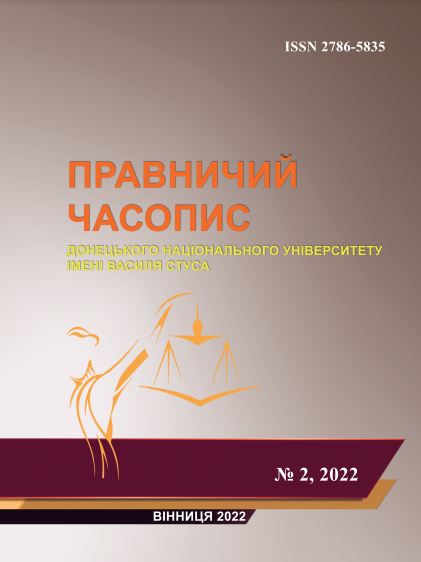Ideas of Freedom and Property as the Basic Principles of the Formation of legal Relations in the Doctrine of H. Hegel
DOI:
https://doi.org/10.31558/2786-5835.2022.2.1Keywords:
freedom; property; principle of law; human rights; Hegel; legal relationsAbstract
The article examines H. Hegel’s understanding of freedom and property as ontological and legal categories reveals their fundamental meaning for the formation of the legal subjectivity of a person. The authors highlights the position regarding the inalienability of freedom and property as attributes of legal existence as well as the logical connection. Property is considered as the subject’s initial perception of the world of things and the distinction between one’s own and another’s existence which establishes the principle of privacy and individuality in legal relations.
Freedom, as an inalienable property of a person, presupposes subjectivity, which allows meaningful development of the internal (legal awareness) and external (legal behavior) aspects of legal reality. There are phenomena endowed with subjectivity, equally endowed with freedom, therefore they are separated from each other and cannot be considered through the prism of ownership. On the other hand, there is a world of things that are not endowed with freedom, subjectivity and rights, but can receive their purpose from the owner. From Hegel’s position it follows that a thing that is not endowed with a free spirit is perceived through the category of property, since it is not equal to it, so it can be appropriated by a free spirit.
A thing can be endowed with the will of a person since a person is able to find an application for it in his being to give it a purpose. This is due to the ontological hierarchy of entities that are endowed with freedom and those that do not have it, and accordingly can become property.
Freedom manifests itself through property, personal existence expands the horizons of one’s belongings, and on the contrary limits them through someone else’s property. Freedom is a natural property of a person that is, it is given in him which means that legal understanding cannot occur without this property. A person needs order in coexistence precisely because he has a choice otherwise legal existence would be the presence of programmed human behavior.
References
Гегель Ґ. В. Ф. Основи філософії права, або природне право і державознавство / пер. з нім. Р. Осадчука та М. Кушніра. Київ: Юніверс. 2000. 329 с.
Гоцуляк Ю. В. Правове буття як фундаментальна категорія праворозуміння: становлення та сучасність: монографія. Вінниця, 2020. 312 с.
Лок Дж. Два трактати про правління / пер. з англ. П. Содомора. Київ: Наш Формат, 2020. 312 с.
Гегель Г. В. Ф. Энциклопедия философских наук. Т. 3. Философия духа. Москва: Мысль, 1977. 471 с.

